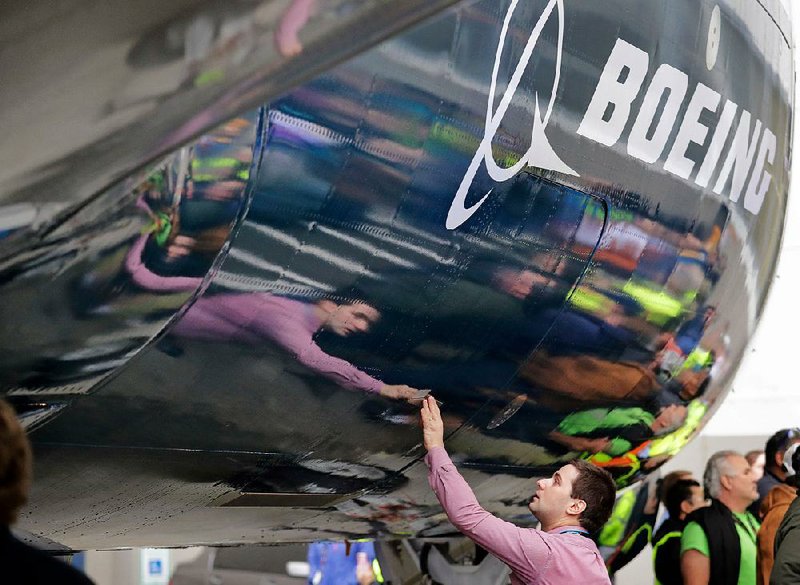European and American companies could lose billions of dollars in canceled commercial deals, and a major new export market has been undercut by the U.S. decision to reimpose sanctions on Iran.
President Donald Trump's decision will likely hurt aircraft makers, oil companies and auto manufacturers. The final impact, however, remains unclear because of possible exemptions for some companies and even new negotiations on a revised Iran nuclear agreement, experts say.
Trump fulfilled a campaign promise by announcing that he will withdraw the United States from the 2015 Iran nuclear deal. Companies worldwide must stop doing business with Iran or risk U.S. fines or other punishment.
U.S. sanctions bar U.S. banks and companies from doing business with Iran. The sanctions also limit foreign companies from dealing with Iran by prohibiting them from using American banks in their operations if they do not sever links with Iran.
Companies and countries with commercial deals with Iran would have either 90 or 180 days to wind down those activities, depending on the sector and type of products sanctioned. Firms would not be allowed to strike new deals with Iran.
U.S. officials said certain waivers can be negotiated, but they did not say what goods or countries might qualify.
Since the Iran nuclear deal was struck in 2015, it was mostly European companies that moved back in to sign deals with Iran. Europe traditionally has had closer business and diplomatic ties than the United States, where the legacy lingers from the seizure of hostages at the American Embassy in Tehran nearly 40 years ago.
The leaders of Britain, France and Germany tried but failed to persuade Trump to stick with the deal. The reaction from some in Europe was bitter. Carl Bildt, the former prime minister of Sweden who is now co-chairman of the European Council on Foreign Relations, said in a tweet that new U.S. sanctions "are hardly hitting any U.S. companies, but aim primarily at European ones."
Aircraft manufacturers stand to be big losers, with the pain shared between Chicago-based Boeing and Europe's Airbus. U.S. Treasury Secretary Steven Mnuchin said the companies' existing licenses to sell planes to Iran would be invalidated. Airbus falls under U.S. rules because its planes include U.S.-made components.
Airbus has already delivered three jets out of a 100-jet order placed in December 2016 by Iran's national carrier, Iran Air. The planes are worth around $19 billion at list prices.
Boeing later announced deals with Iran Air and Aseman Airlines totaling 110 planes said to be worth $20 billion. However, list prices are routinely exaggerated, and aviation consultancy Avitas valued the deals at $9.5 billion, given normal discounts.
The aircraft makers will avoid serious damage. The Iranian deals represented a blip in Boeing's business. Boeing never added the planes to its backlog -- and if it had, they would have represented less than 2 percent of its 5,800 orders.
Boeing prepared investors for the setback. CEO Dennis Muilenburg said last month that losing the Iranian sales wouldn't slow down production.
Gordon Johndroe, a Boeing vice president, said in a statement: "We will consult with the U.S. Government on next steps. As we have throughout this process, we'll continue to follow the U.S. Government's lead."
Adam Pilarski, an Avitas analyst, said that the immediate impact to Boeing and Airbus would be minimal partly because the Iranian sales were always in doubt.
In the long term, however, "Iran is the big hope of aviation manufacturers" because of its large population -- about 80 million -- and middle class, its oil assets, and an aging aircraft fleet in need of upgrades, he said.
The United States says the sanctions will also sharply curtail sales of oil by Iran, the world's fifth-largest oil producer. There will be a 180-day period for countries to wrap up existing contracts and achieve "significant reductions" in their purchases of Iranian crude, although Mnuchin did not spell out what the administration meant by the term.
French oil company Total SA has been the most aggressive Western oil company to move back into Iran, signing a $5 billion, 20-year agreement there in July. A Chinese oil company also has a deal to develop the country's large South Pars offshore natural gas field. Total did not respond to requests for comment.
France's Total, Anglo-Dutch Royal Dutch Shell and Italy's Eni were more active in Iran than U.S. companies, which were still limited by other sanctions unrelated to Iran's nuclear program, including a trade embargo.
The price of oil rose sharply on Wednesday to its highest since 2014 on expectations that the new sanctions will crimp Iranian exports. Brent crude, the standard for pricing international oil, rose $2.11, or 2.8 percent, to $76.96 a barrel in London. Benchmark U.S. crude gained $2, or 2.9 percent, to $71.06 a barrel in New York, the highest level since late 2014.
In other sectors, French carmaker PSA Peugeot Citroen agreed in 2016 to open a plant producing 200,000 vehicles annually in Iran, and says it is studying the implications of the U.S. move. Fellow automaker Renault signed a $778 million deal to build 150,000 cars a year at a factory outside Tehran but has declined to comment so far.
German industrial equipment manufacturer Siemens, which has multibillion-dollar contracts with Iran for rail, power plant and other projects, said it is assessing the possible impact but expects it to be immaterial. It said it will comply with any sanctions.
Information for this article was contributed by Martin Crutsinger, Jon Gambrell, Frank Jordans, Raf Casert and Matt Ott of The Associated Press and by Steven Mufson and Damian Paletta of The Washington Post.
RELATED ARTICLE
http://www.arkansas…">Trump warns Iran not to restart nuclear work
Business on 05/10/2018

